All wars end sometime, somehow. Formally, legally, they need a treaty between the belligerent parties to set out the terms on which the fighting will end and when the post-war period will be conducted.
Ukraine is a long way from that point. But the US is trying to get it there - quickly - by applying something close to maximum pressure on the nation to come to terms with the invader.
The US has justified its meeting with Russia as marking the first step towards creating the conditions for a peace agreement to end the war in Ukraine.
It argues that the war is going nowhere, and somebody has to step in and try something different.
This is something different - an offer to the Russians of normalised relations with the US, the prospect of ending sanctions which have damaged the Russian economy in return for a process to shut down the war.
The Russians have responded in kind - a flattering offer to Donald Trump to broker a deal directly with Vladimir Putin, with the prospect of riches for US companies operating in Russia in the post-war period (an offer which in itself proves that sanctions are hurting - as does the request to end them).
Both say Ukraine will be involved - but, it appears, very much as the junior partner.
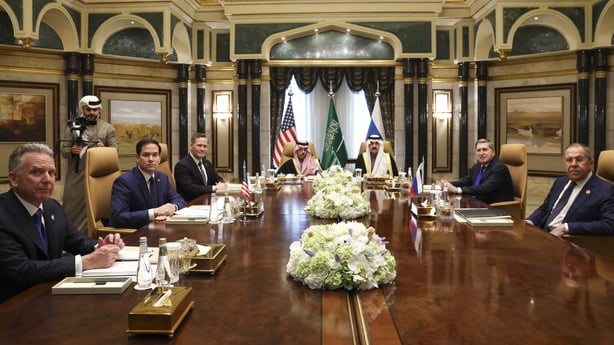
The Russians and the Americans meanwhile have agreed to nominate negotiating teams to explore a peace deal for Ukraine.
As for the Europeans, both inside and outside the EU, who have borne the brunt of the external military and civil cost (keeping the Ukrainian government upright and the economy and society working as normally as possible away from the front line), the message has been dismissive from both the US and Russian sides.
It's very transactional - quid pro quo.
Land for peace, commerce for diplomatic inclusion. A deal to be done. A local issue to be sorted out by the big powers.
On the surface, it looks appealing and fairly straightforward. The warning voices are coming from old Russia hands in the US, like John Bolton who was Trump's National Security Advisor in his first administration, and Lieutenant Colonel Alexander Vindman, who was US military attaché in Ukraine during that same administration.
Lt Col Vindman said the very fact that this meeting happened was a morale boost to the Russians, and a morale hit for the Ukrainians. He said it rewards Russia for using force to get what it wants, so is an attack on diplomacy.
Read more:
'You should have never started it' - Trump blames Ukraine after Russia talks
Who's who - The negotiators from US and Russia in Riyadh
The third year of the Ukraine war in facts and figures
Though he added that if Trump does not quickly get results from his dealings with the Russians he could suddenly put the weight of the US behind Ukraine, and apply much more pressure on Russia.
Countries on the east side of the EU, who have long experience of dealing with the Russians in general, not just Putin, are also sounding the alarm, particularly over the apparent exclusion of Ukraine from the talks.
The Russian delegation was led by veteran foreign minister Sergei Lavrov, who has held the post for 21 years, and is one of the most skilled players in international diplomacy.
The US side was led by his counterpart Marco Rubio, not yet a month in the job.
The key players in brokering the meeting are interesting: on the Russian side Kiril Dimitriev, a Harvard-educated former Goldman Sachs banker and McKinsey consultant, who now runs the Russian Sovereign Wealth Fund (about €100 billion – not huge for a petro-state, it was about €200bn before the war).
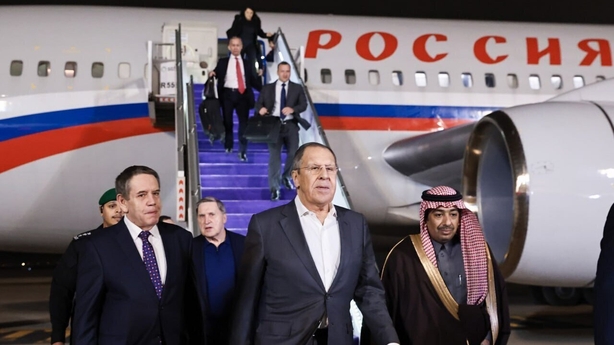
According to the Wall Street Journal, Dimitriev is well connected to Saudi Crown Prince Mohammed bin Salman - MBS as he is widely known outside the Kingdom. It was he who put Dimitriev in touch with Steve Witkoff, the billionaire New York property developer and friend of Donald Trump, who is officially the Middle East envoy for the administration.
Witkoff and Dimitriev brokered the agreement that led to the release from a Russian prison of US teacher Marc Fogel.
The Middle East envoy travelled to Moscow on his own private plane to complete the deal where he spoke to Putin.
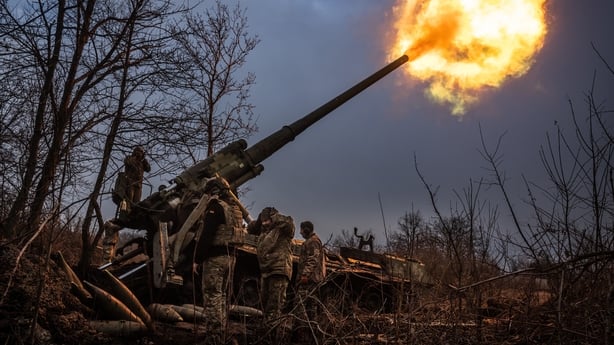
This was the opening move by the Russians, a response to Trump's overtures of the preceding weeks, which included floating the idea of a meeting between himself and Putin.
After the meeting both the Russians and the Americans spoke about the commercial opportunities that could follow the end of the war.
Dimitriev estimated US corporate losses following their withdrawal from Russia in 2022 at $300 billion. He was particularly concerned about the US oil and gas majors.
Last week, Trump dispatched his Treasury Secretary Scott Bessant to Kyiv to float a deal with Ukraine, in which the US would get ownership rights over half of Ukraine’s deposits of rare metals and minerals, notably lithium and graphite - both heavily in demand for battery vehicles.
Other rare minerals are wanted by various hi-tech industries worldwide.
There is a large concentration of these minerals and metals in the territory the Russians have seized from Ukraine. Might they form part of the deal between the US and Russia?
The US President himself said he might be able to meet the Russian leader next month, but did not have any firm idea about where such a meeting could take place.
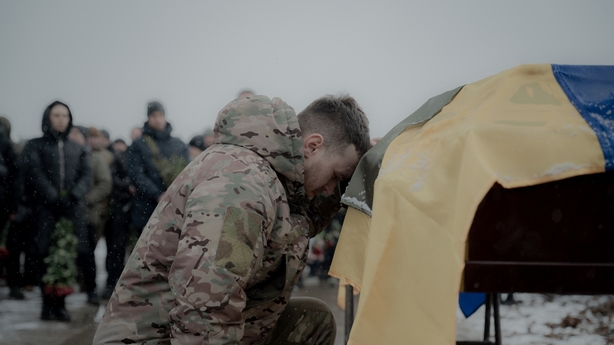
That would be a big diplomatic victory for Putin, who has been isolated by the West since he invaded Ukraine three years ago.
Even getting the Saudi meeting counts as a diplomatic win for Putin. The US setting out as a starting point the concession of Ukrainian land currently occupied by Russian forces, and shutting the prospect of NATO membership for Ukraine would count as real wins for Russia - and real losses for Ukraine.
While the US-Russia talks were going on in Saudi Arabia, Ukraine’s president Volodymyr Zelensky was in Ankara, meeting his Turkish counterpart Recep Tayyip Erdogan.
Turkey had hosted peace talks between Russia and Ukraine in April of 2022 - after the Russians had failed in their attempt to capture Kyiv - at which an outline agreement was sketched out for an end to hostilities not too dissimilar to the idea the Americans and Russians looking at now - a loss of territory for Ukraine in the east in return for some "security guarantees" from someone.
The Russians insisted that Ukrainian membership of NATO was not an option. And somewhere the possibility of Ukraine joining the EU was floated as a possible second best to NATO.
At yesterday's talks Turkey offered itself as a possible venue for talks involving Russia, the US and Ukraine.
Erdogan also said he strongly supports Ukrainian territorial integrity, sovereignty and independence.
The Ukrainian leader was supposed to go on to Saudi Arabia but cancelled the meeting so as not to give the impression that he was engaging in some sort of "parallel negotiations".
He welcomed the idea of EU, British and Turkish troops being stationed in Ukraine as part of "security guarantees" - a topic that has dogged all talk of peace since the start of the war.
Donald Trump, reacting later, said that Ukraine could have negotiated an end to the war at any time over the past three years, and appeared to blame Ukraine for starting the war.
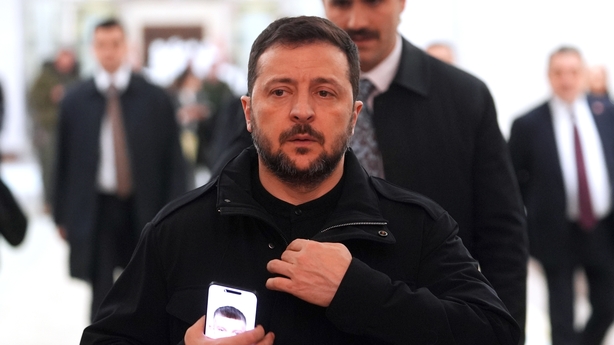
The US president said of Zelensky: "Today I heard 'oh, well, we weren’t invited'. Well, you've been there for three years. You should have ended it three years - you should never have started it. You could have made a deal".
Trump also said he did not have a problem with European forces being stationed in Ukraine.
However, Lavrov said Russia would not accept NATO forces operating there under any flag - EU, NATO or their own.
Trump also said he would like to see elections in Ukraine soon. So did the Russians, mentioning it in yesterday's talks as a requirement before final sign off on a peace deal.
Ukrainian commentators are sceptical, seeing the Russian call for elections as a delaying tactic that would allow them to regroup and focus military force during the election period, or use the election or its outcome as an excuse to call off the deal if it does not suit.
They also point out that under martial law - which the country has been under since the Russian invasion - elections have been suspended.
Either martial law is ended to hold an election - risky for a country at war; or the law is modified to allow an election during martial law - which would take time to go through parliament, using time and distracting resources.
Again, advantage Russia.
Perhaps the most realistic comment came from US Secretary of State Marco Rubio, who called yesterday's talks with the Russians "the first step in a long and difficult journey".
But at the pace Trump has been working - and the better spring weather on the way to the battlefields in Ukraine - there may be little patience for long journeys in the White House.






